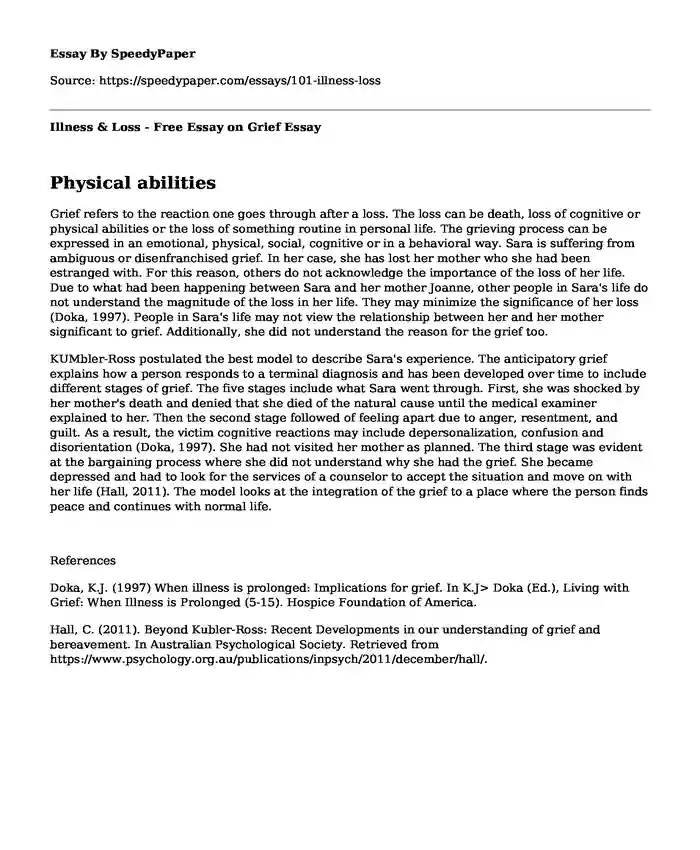
| Type of paper: | Essay |
| Categories: | Health and Social Care Psychology |
| Pages: | 2 |
| Wordcount: | 376 words |
Physical abilities
Grief refers to the reaction one goes through after a loss. The loss can be death, loss of cognitive or physical abilities or the loss of something routine in personal life. The grieving process can be expressed in an emotional, physical, social, cognitive or in a behavioral way. Sara is suffering from ambiguous or disenfranchised grief. In her case, she has lost her mother who she had been estranged with. For this reason, others do not acknowledge the importance of the loss of her life. Due to what had been happening between Sara and her mother Joanne, other people in Sara's life do not understand the magnitude of the loss in her life. They may minimize the significance of her loss (Doka, 1997). People in Sara's life may not view the relationship between her and her mother significant to grief. Additionally, she did not understand the reason for the grief too.
KUMbler-Ross postulated the best model to describe Sara's experience. The anticipatory grief explains how a person responds to a terminal diagnosis and has been developed over time to include different stages of grief. The five stages include what Sara went through. First, she was shocked by her mother's death and denied that she died of the natural cause until the medical examiner explained to her. Then the second stage followed of feeling apart due to anger, resentment, and guilt. As a result, the victim cognitive reactions may include depersonalization, confusion and disorientation (Doka, 1997). She had not visited her mother as planned. The third stage was evident at the bargaining process where she did not understand why she had the grief. She became depressed and had to look for the services of a counselor to accept the situation and move on with her life (Hall, 2011). The model looks at the integration of the grief to a place where the person finds peace and continues with normal life.
References
Doka, K.J. (1997) When illness is prolonged: Implications for grief. In K.J> Doka (Ed.), Living with Grief: When Illness is Prolonged (5-15). Hospice Foundation of America.
Hall, C. (2011). Beyond Kubler-Ross: Recent Developments in our understanding of grief and bereavement. In Australian Psychological Society. Retrieved from https://www.psychology.org.au/publications/inpsych/2011/december/hall/.
Cite this page
Illness & Loss - Free Essay on Grief. (2018, Dec 11). Retrieved from https://speedypaper.com/essays/101-illness-loss
Request Removal
If you are the original author of this essay and no longer wish to have it published on the SpeedyPaper website, please click below to request its removal:
- Free Essay with a Critical Analysis of The Bronze Horseman
- Reflective Practice Research Paper Sample
- Free Essay on How the Internet Has Helped LGBT Youth over the Past Few Years
- Eating Meat Essay Sample
- Free Essay on Emotional Intelligence and Patient Safety
- Essay Sample: Comparison of Mexico and Japan
- Free Essay. Issues Of 'Professionalism' and 'Professional Practice' In Relation to Home Economics
Popular categories




